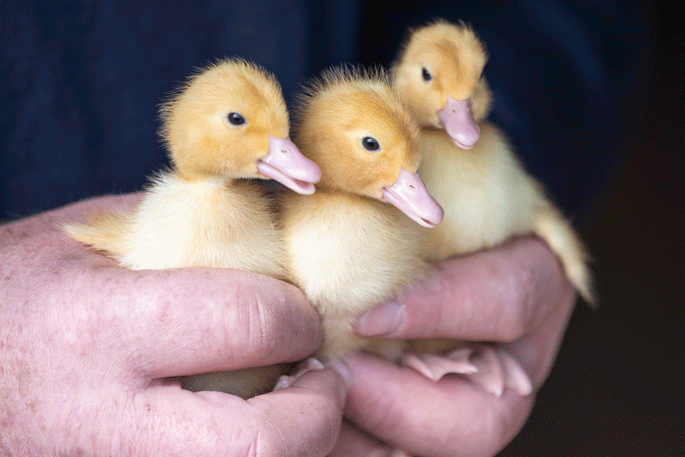After being brought up on a dairy farm, dairy farming himself and negotiating dairy grazing contracts for many years, Paul Knudsen took on a new challenge in 2011 and turned his hand to the niche business of duck farming near Matamata.
“The 34 hectare property had an existing duck business growing meat birds and 70 dairy cows, milked once a day through a 12ASHB shed. I stopped milking in 2018 and switched to grazing dairy heifers,” says Paul.
Duck farming cycle
The farm has three growing sheds set up to continually accommodate six age groups. There are 5500 birds in each group on a 42 day cycle.
“The industry code of practice is not to exceed 18 kilogrammes per square metre, which equals six fully grown ducks. I operate well under those numbers.”
There are a constant 33,000 Pekin ducks on the farm and Paul and farm manager Dave run things between them.
“Every week we take a delivery of one-day old ducklings, send the six week old ducks off for processing and are paid weekly on live weight gain.”
The new one-day old arrivals are unloaded into the smaller brood room heated to 32 degrees Celsius. The temperature is slowly reduced over five days until being turned off, so at 10 days the ducklings can be moved to one of the larger sheds.
From one day old the new arrivals are fed high protein starter crumble and transitioned onto grower feed at 10 days old.
“We have three 15 tonne silos for the grower feed and two three tonne silos for the crumble. We use in-shed auto feeding systems to distribute 32 tonnes of feed a week.”
Hygiene and care
It’s a high priority to keep the ducks clean and safe and anyone entering the sheds uses a disinfectant footbath.
“The sheds are rodent proof and there are bait stations around all the external perimeters. Wild birds pose a health risk as they can carry diseases such as salmonella, and netting mesh on the openings prevents them coming in.
“The shed’s awning sides remain open daily for ventilation as the growing sheds are not temperature or humidity controlled due to their low stocking rate compared to chickens.”
Paul provides fresh water pumped to the sheds from an underground spring system on the farm. The ducklings drink from autofill bell feeders, but the older ducks have autofill water troughs.
“Ducks drink a lot of water and use it to clean themselves. We test our water supply for contaminants regularly.”
The ducks are not medicated or given hormones.
Shed hygiene is paramount to duck health and growth. The ducks are raised on wood shavings and all sheds get a top up daily.
The brood rooms are cleaned out before the next batch of day old ducklings arrive and sprayed with sanitiser.
“At nine week intervals, we clean out that shed completely, spray it with sanitiser and sprinkle hydrated lime around the edges which acts as a steriliser, before laying new shavings.”
The used shavings (duck litter) are picked up by two neighbours for use as fertilizer on their farms.
Shaving issues
Duck and poultry farms use large amounts of wood shavings from wood processing. With the building industry slowing down and the mills directing their shavings to make wood pellets or burn it themselves to meet their sustainability goals, the farming industry is finding it harder to source shavings.
“We expect shortages around calving and lambing times, but this season has been particularly difficult as we require 100 cubic metres each week.”
Paul remembered watching a rural TV program around some years ago that was discussing the merits of miscanthus use on turkey farms in the United States.
A member of the grass family, poaceae, miscanthus is grown from a sterile rhizome and will never seed or spread.
“I started Googling, found Miscanthus New Zealand and approached them. I was able to locate a supplier and brought in some bales.”
Paul hired a harvester and hand fed the bales through, ending up with a more manageable straw like product.
“I trialled it by using shavings down one side of the sheds and miscanthus on the other. It’s interesting because the ducks actually prefer the miscanthus.”
His initial feedback is that miscanthus is much drier, absorbs ammonia really well, but is harder to spread in the sheds.
The farm is one of five contracted to Quackaduck in Cambridge, who also manage their own egg production farm and hatching facility that supplies the growers.
Quackaduck business manager, Matthew Houston, explains that the there is an established local market for duck products, along with an export business into the Pacific, Middle East, Philippines, Japan.
“The business model is simple, with good cash flow as ducks leave the farms weekly and is relatively easy for someone with livestock experience.”



0 comments
Leave a Comment
You must be logged in to make a comment.